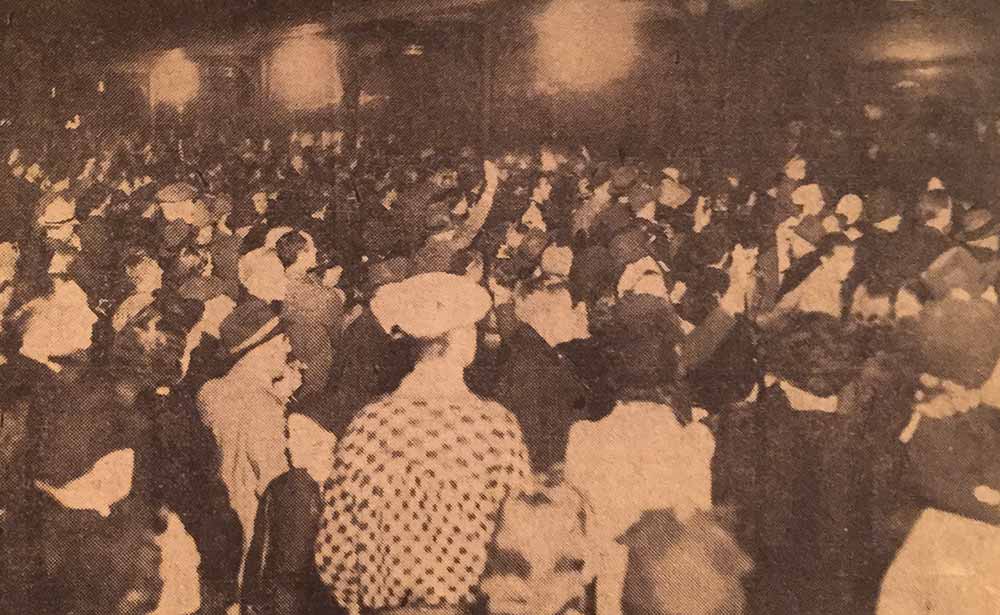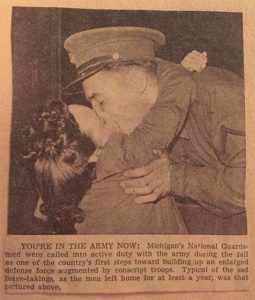
- Historical Date: October 26, 1940
- Location:Muskegon, Michigan
Crowd of 20,000 Lines Streets for Parade, Veterans Solemn as Company G Leaves.
Hushed by thoughts that Muskegon’s more than 100 members of Company G and Headquarters company of the Michigan National Guard might not return after a year’s training in Louisiana, about 20,000 Greater Muskegon residents turned out last night to bid them goodbye.
Against a background of exploding aerial bombs, stirring martial music and booming factory signals, solemn veterans of other wars, serious-faced parents and others lined Terrace street and Western avenue several deep as the parade moved to the special train at the Pere Marquette station.
It was the greatest parade crowd here since Centennial days of 1937.
Occasional applause broke out as the men newly sworn into the United States Army moved along at the head of the parade, but for the most part the crowd reflected the seriousness of America’s first peace time call to the colors.
As the parade neared the station, the crowd followed surging about the train for emotional farewells as relatives, friends and others packed the wide area extending back to Western avenue.
Led By Massed Colors
The drum and bugle corps of the Haig post, Canadian Legion, led the men and officers of Company G and the headquarters unit, following the massed colors of all Greater Muskegon veteran’s organizations.
Solemn and serious faced, more than 300 veterans marched behind the departing soldiers, their thoughts plainly upon the days of 1898 and 1917. The shook hands earnestly with the young men, wishing the the best of luck, and above all, a speedy return to their homes.
“YOU’RE IN THE ARMY NOW: Michigan’s National Guardsmen were called into active duty with the army during the fall as one of the country’s first steps toward building up an enlarged defense force augmented by conscript troops. Typical of the sad leave-takings, as the men left home for at least a year, was that pictured above.”
Following the veterans, Legionaires, DAV members, Veterans of Foreign Wars, Spanish American War veterans and independent veterans’ organizations, came troops of Boy Scouts and Sea Scouts, parading by hushed crowds which wondered, perhaps, if these boys would be the next generation of soldiers.
The Sons of the Legion drum and bugle corps and the Campbell Wyant and Cannon band headed delegations of Greater Muskegon workers, also paying their tribute to the officers and men of the departing units.
The parade started at 7 p. m. and proceeded down Terrace street to Western avenue and then to the Pere Marquette station where the men were given 15 minutes to say farewell.1
Reflections
This very somber article paints of a picture of the veterans and parents who knew all too well what war meant. It was October of 1940. France had fallen to the Nazis. Britain was being bombed. The U.S. had not yet entered the war but the National Guard had been called up, and a draft had been initiated without a war for the first time in history. Those who lived through the Great War knew what was coming.
It was still more than a year before the attack on Pearl Harbor. The National Guard had been called up for one year of training, but the writer mentions that people were thinking that some of them might not return. No one really knew that a war was coming, and yet they understood that it could.
The writer called out “troops of Boy Scouts and Sea Scouts, parading by hushed crowds which wondered, perhaps, if these boys would be the next generation of soldiers”. And he was right. The Boys Scouts and Sea Scouts most likely went off to war themselves in the years that followed.
After reading this article, I remembered when a local soldier was killed in Iraq. It was 2007; there was a memorial service here for him. My own boys were Boy Scouts, and the troop attended the service. My grandfather was there, too. He had come by himself, at 88 years old, to attend the service. I did not know he would be there. He came because he, too, understood what war was, and knew what it meant to send our boys away to fight.
- Muskegon Chronicle, Oct. 26, 1940.


0 comments